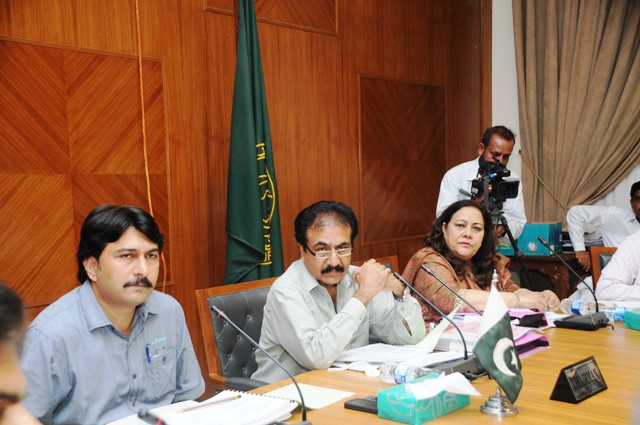Audit report: All’s not well with police accounts
Govt bodies owe Sindh police Rs643m for their services from 2006 to 2009, PAC meeting told.

The State Bank of Pakistan, National Bank, Pakistan Telecommunication Authority, House Building Finance Corporation and the Karachi Metropolitan Corporation among others owe millions of rupees to the police department for its security guard service.
The session, presided over by PAC chairman Jam Tamachi Unar, took up the matter relating to the audit of the police and home departments. Fayyaz Leghari, the Sindh inspector general of police, also attended the meeting.
The amount under the head of “Police Guard Service Charges” was supposed to be paid in advance to the police department, the auditors submitted. “Some organisations paid the amount to district and town police officials, but it was not deposited in government accounts,” Ghulam Akbar Sohu, the Audit director general, stated.
“We will take action against the police officials concerned,” retorted the Sindh police chief, Fayyaz Leghari, responding to the objections. He also clarified that his department had written to the defaulters, but in vain.
Electricity bills
The outstanding power bills amounting to Rs48 million of the police department also came under discussion at the meeting. The bills issued by the power distribution companies were exorbitant and fake, alleged Dost Ali Baloch, the AIG Police (Finance). Referring to a specific case, he said that Wapda initially claimed arrears of Rs7 billion which were later slashed to Rs1 billion after an inquiry.
“We are paying Rs200,000 for one fan,” Baloch said. “We have set up an internal mechanism at the central police office, where we can identify power consumption in Karachi, Sukkur and Hyderabad and other regions,” he said.
The audit director also raised the issue of irregular payment of Rs2.9 million in cash rewards to police officials for their “extraordinary feats”, but their performance was not shown casting doubts on the reward distribution.
Fayaz Leghari promised to look into the matter, saying as the police chief, he was allowed to announce rewards up to Rs1,000. The chief minister’s approval is needed for rewards above Rs1,000.
The auditors also objected to the police expenses of Rs5.314 million in Karachi and Sukkur on account of petrol, electricity arrears, feeding charges and Photostats, which were not mentioned in the record.
It was revealed that police officers in Badin, Mirpurkhas, Karachi and Sanghar embezzled around Rs3.29 million during the period audited. “They got the cash, but it was neither used up nor was it returned to the Sindh government account.”
The policemen posted in remote areas especially in forests or hilly areas are paid allowances up to 20 per cent of their basic salaries. The auditors informed the meeting that Rs3 million was released in the name of “hardship” allowance for the police personnel, but it was not paid to the personnel deployed in Dadu, Hyderabad and Naushahro Feroze.
Police officials in Sukkur and Karachi divisions received Rs20 million from 168 rented shops, but from 2003 to 2007, the amount was deposited in the police welfare fund rather than the treasury, said Ghulam Akbar Sohu, the audit director general. But the AIG finance replied that the rented shops were in fact being utilised for the welfare of police.
In police record of 2008-9, huge amounts were spent on the renovation of police residential buildings and police stations, but their actual condition states otherwise. Police officials in 17 districts spent Rs18.513 million on the repair of buildings, but did not put the amount to paper, the auditors said. Irregularities worth millions of rupees were reported in expenditures without supporting vouchers, irregular payments and awarding tenders without formal approval.
Open kutcheries
The committee members expressed its dismay over the worsening law and order situation in Sindh and advised the police chief to hold “open kutcheries” (public meetings) to resolve the issues. The police are influenced by politicians and their frequent transfers and postings affect their performance, said PAC Chairman Jam Tamachi Unar. “Why don’t you [Sindh IG] set a precedent by starting tenure postings for police officials,” he suggested.
Published in The Express Tribune, August 28th, 2012.


















COMMENTS
Comments are moderated and generally will be posted if they are on-topic and not abusive.
For more information, please see our Comments FAQ